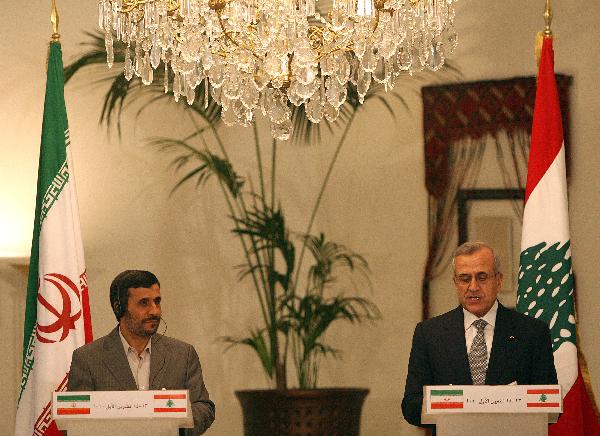Iranian president wraps up visit to Lebanon
|
|
|
Iranian President Mahmoud Ahmadinejad (L) attend a press conference with Lebanon's President Michel Suleiman in Beirut, capital of Lebanon, Oct. 13, 2010. [Xinhua] |
Also on Thursday, Israeli troops were seen conducting extensive patrols along the border with Lebanon, while Israeli Foreign Ministry spokesman Yigal Palmor said Ahmadinejad had brought a message of "violence and extremism" to Lebanon.
"The world should realize the Zionists will perish ... today Lebanon is alive and is a role model for countries in the region," the Iranian president said.
Ahmadinejad's visit to south Lebanon on Thursday was the first one for an Iranian head of state. Mainly Shiite Muslim country Iran has funded and supported Hezbollah since its establishment in the 1980s.
Following the 2006 summer war with Israel, Iran has contributed to relief and reconstruction efforts of the battered south Lebanon villages and the Beirut southern suburbs, better known as Dahiyeh.
On his second stop in south Lebanon's Qana, the Iranian president also placed a wreath on the memorials of Lebanese who were killed during Israeli raids on the south Lebanese town of Qana in 1996 and 2006.
While the Iranian president reiterated his country's support to Lebanon's struggle against Israel during his two-day visit, Ahmadinejad vaguely touched upon the thorny issue of the UN-backed court to try suspects in the assassination of Lebanese former Prime Minister Rafic Hariri.
Hariri's son, Sunni Prime Minister Saad Hariri and Hezbollah have been locked in a standoff over the indictment to be issued by the Special Tribunal for Lebanon (STL) probing the 2005 Hariri assassination. Reports have suggested that the STL will issue a verdict against "rogue" members of Hezbollah.
Ahmadinejad held talks on Thursday with Saad Hariri at the government's house, the Grand Serail.
Speaking to reporters on Thursday, Iranian Ambassador to Lebanon Ghazanfar Roknabadi said his country considered the issue of the STL was a "strictly Lebanese issue". "Talks with Lebanese officials tackled several issues including that of the tribunal " we already said that we are exerting all possible efforts to preserve the unity of the Lebanese," said the Ambassador.
The only time Ahmadinejad implicitly mentioned the issue of the STL in his two-day visit was when he slammed the "fabricated" claims that Hezbollah was involved in the assassination of Rafic Hariri during a rally in Beirut's southern suburbs of Dahiyeh on Wednesday.
He said Rafic Hariri was killed by "deceitful hands," and described him as "dear friend who cared about his country."
"We are now witnessing how news reports are fabricated and international justice organizations are exploited to implicate other friends (Hezbollah) so as to sow strife," said the Iranian president.
Ahmadinejad, who was awarded an honorary doctorate in political sciences from the Lebanese University on Thursday, stressed his country's right to the development of nuclear technology for peaceful purposes, in a lecture he delivered afterwards.
One day earlier, Ahmadinejad offered his Lebanese counterpart an Iran-made nanoscope, for scientific research. The nanoscope, according to the Iranian president, is a technologically complicated and advanced device that only six countries own.
The Iranian president's visit received heavy criticism by Israel and the United States, which described the visit as " provocative".
U.S. State Department spokesman Philip Crowley said on Thursday that Ahmadinejad's tour of a Hezbollah stronghold in south Lebanon undermines Beirut's sovereignty and the region's security.
 0
0 







